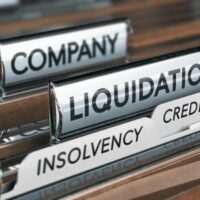Insolvency And Business Bankruptcy: Things To Consider

What is the relationship between insolvency and business bankruptcy? Typically, the term “insolvency,” or being insolvent, is not used to discuss consumer financial circumstances but rather to explain the financial situation of a business. While the term can be applied to individuals and businesses alike, it is a term that is frequently used to describe businesses that cannot pay the debts that they owe. According to the Cornell Legal Information Institute (LII), the term is “not definitely fixed” and can apply in varying circumstances, but may often be used to describe, for example, “a troubled company . . . when it is unable to repay its creditors money owed on time, often leading to a bankruptcy filing.” Yet it is important to understand that insolvency is not the same as bankruptcy. To be sure, being insolvent does not necessarily mean that a business is bankrupt.
As Debt.org clarifies, “you can be insolvent without being bankrupt, but you [cannot] be bankrupt without being insolvent. If you have concerns about insolvency or want to learn more about business bankruptcy, you should seek advice from a West Palm Beach bankruptcy attorney. In the meantime, we can provide you with more information about insolvency and bankruptcy, and how the two terms related to one another.
Understanding Types of Insolvency
As we discussed above, insolvency is a term that is used to refer to a debtor’s inability to pay its debts. When a business is insolvent, the business is not making enough profits in order to pay the debts it owes. Oppositely, the term “solvency” or “solvent” refers to a company that is able to pay its debts, and that is making enough money in profits to cover its debts. According to a NerdWallet article, businesses are typically said to be solvent when they are able to make a profit currently and have a business operation in place that makes it likely for the business to continue making a profit in the future. In addition, the business’s capital structure can point to its solvency or insolvency.
What does a business’s capital structure have to do with solvency or insolvency? As Debt.org explains, “insolvency comes in two flavors.” The first type of insolvency is commonly described as “cash-flow insolvency,” which means that a business does not have enough cash flow or liquidity to make specific payments to a debtor. The second type of insolvency concerns the business’s capital structure, and it is commonly known as “balance-sheet insolvency.” This type of insolvency happens when a business’s debts exceed its assets.
When Does Insolvency Lead to Business Bankruptcy?
When a business is unable to resolve its insolvency, it may need to consider bankruptcy. Usually, insolvency will result in debt collection efforts and issues with debt collectors. If the business cannot find a way to become solvent again, bankruptcy might be the only solution. The business may be able to reorganize debts with a Chapter 11 bankruptcy filing, or it may need to liquidate and close the business through a Chapter 7 bankruptcy filing.
Contact a West Palm Beach Business Bankruptcy Attorney
If you have questions about insolvency and business bankruptcy, you should get in touch with one of the experienced West Palm Beach bankruptcy lawyers at Kelley Kaplan Delaney & Eller, PLLC, for more information. Our firm can evaluate your business’s financial circumstances and can provide you with more information about the benefits and limitations of business bankruptcy in Florida.
Sources:
law.cornell.edu/wex/insolvency
debt.org/faqs/insolvency/
thebalance.com/signs-your-small-business-is-insolvent-5198826



